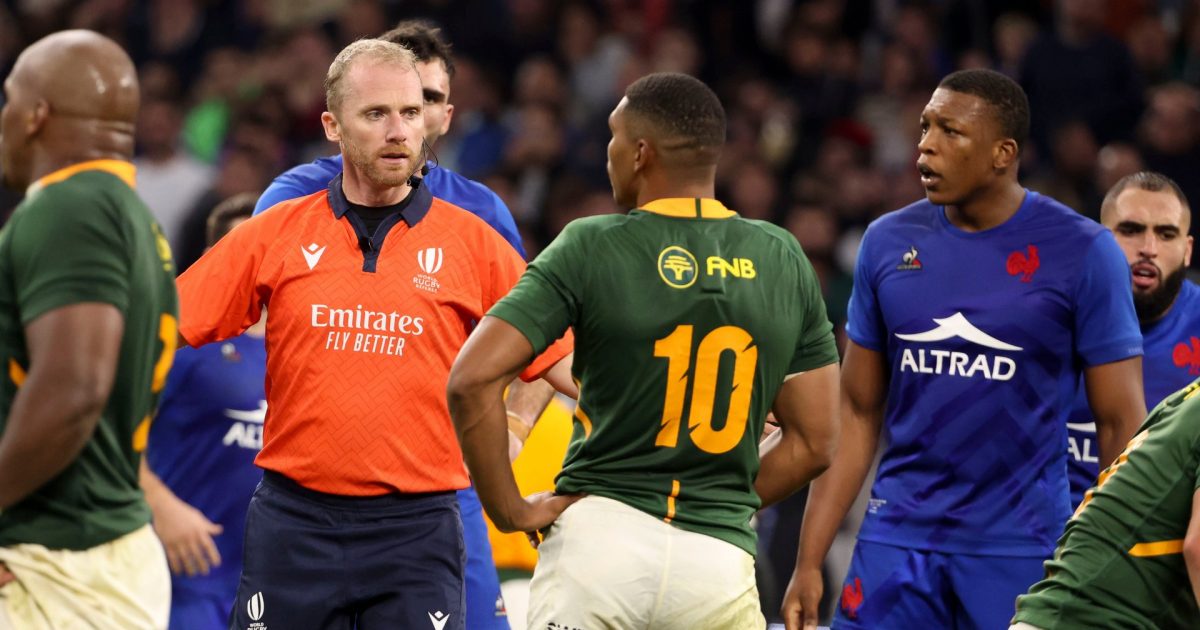Wayne Barnes reveals he almost quit rugby after harrowing online abuse after South Africa versus France

Referee Wayne Barnes has revealed how the toll of online abuse led to discussions around giving up the whistle to continue as a lawyer after officiating France’s Test against South Africa.
The 43-year-old detailed a harrowing account on The Good, the Bad & the Rugby podcast of direct abuse aimed at his partner Polly in the aftermath of the game that threatened his family.
The experienced match official said he thought he was prepared for most criticisms after over 100 Tests, but the reaction spilled into the realm of ‘a different level’ to what he has seen in the past.
“Criticism on social media quickly becomes abuse,” Barnes told The Good, the Bad, the Rugby.
“That is the world we live in. That is social media. But I make the decision to be a referee, make the decision to be on social media. Polly, my wife, doesn’t make the decision to be a referee.
“On the Saturday night, there started to be some direct abuse at Polly. And then, the following two or three days, there was direct abuse to Polly. Threats of sexual violence and threats against the kids.
“To Polly and to me, direct threats about our kids. That takes it to a different level.
“When you’ve done 100 games, you’ve got a lot of experience, you think you can prepare for most things. You can’t prepare for that.
“When I said it’s been a s***** couple of weeks, it’s been a s***** couple of weeks.
“It wasn’t even a line that was crossed, you’ve gone so far beyond it you can’t even see the line.”
“I sacrifice, but it’s a family sacrifice and you do think, ‘I’ve got this other decent job to go to. I’m a partner at a law firm and they’re keen for me to come back full-time’,” he said.
Springboks Director of Rugby Rassie Erasmus famously began tweeting clips of the game of instances that went against South Africa, creating a firestorm on social media that became a divisive issue.
On whether Erasmus’ tweets were directly to blame of the abuse, Barnes said he couldn’t make that conclusion but said he was disappointed that a review was taken place in the public arena without giving him a chance to explain his decisions.
“If people see people in positions who are meant to uphold the values of our game, openly criticising referees then I think it allows others to say well ‘why can’t I?'” Barnes said.
“I’m disappointed about the way… there is a process that we go through post-match, there is a formal way of discussing the game and highlighting any issues of concern.
“Where you would say ‘can we have feedback on these?’, we can do that online, we can do that face-to-face if that’s what works.
“I’ve always been very open to that, I want to learn, I want to get better. If there are things I didn’t get right, I want to understand why.
“I didn’t get that opportunity after that game, that’s what disappoints me is all of a sudden a review is played out in the public arena rather than the agreed arena.”
Barnes revealed that a committee of the international referees got together and widely agreed that something needs to be done to protect match officials.
What happened after the France-South Africa test was just the latest in what has become common after big Test matches.
“The review process is, you get back from the game on Sunday. We all got together Sunday night, Monday morning, as a group of international referees, and we all said ‘this has to stop’,” Barnes said.
“This is my personal story, Nic Berry, a wonderful man, the abuse that he got, and his family got, direct, during the Lions series. Marius Jonker, the TMO, direct abuse to him and his family.
“Andrew Brace, after the England-France game. People sending him messages about his dad’s obituary, like what world do we live in that anyone thinks that’s right?
“It was a point where the referees said something needs to be done. We need to be protected.”


























